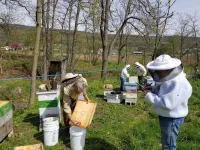(Press-News.org) UNIVERSITY PARK, Pa. — Honey bee colonies managed using organic methods were as healthy and productive as those managed in conventional systems, while avoiding the use of synthetic pesticides to control pests and pathogens inside the hive, according to newly published research led by Penn State entomologists.
The researchers said they believe that their study, which compared the performance of honey bees under three types of management systems, is the first to show that organic beekeeping management is sustainable and supports high honey-bee survival and honey production.
The methods beekeepers use to manage honey bee colonies are crucial in helping their bees overcome stressors such as pests, diseases, pesticide exposure and nutritional deficiencies, noted study lead author Robyn Underwood, apiculture educator for Penn State Extension.
“Beekeeping management is a key aspect of honey bee health because it can help mitigate some of the negative effects caused by these stressors,” Underwood said. “For example, supplemental feeding can mitigate a lack of flowering plants nearby for foraging, and beekeepers can manage pests such as Varroa mites with cultural, mechanical and chemical control practices.”
Despite these management tactics, 30% or more of honey bee colonies in the United States — including about 40% in Pennsylvania — die each winter, and beekeepers around the world continue to seek advice on best management practices to maintain healthy and productive bees.
Study co-author Margarita López-Uribe, associate professor of entomology and Lorenzo L. Langstroth Early Career Professor in Penn State’s College of Agricultural Sciences, pointed out that there has been little research conducted on organic beekeeping, primarily because of requirements that limit beekeepers’ ability to sell their products as certified organic.
“In addition, existing studies largely have looked at the effect of one or two aspects of management at a time,” she explained. “But in reality, risks and benefits occur in the context of numerous other management decisions involved in beekeeping. Studies like ours using a systems approach can help us better understand the long-term trade-offs among the various practices.”
To evaluate the effectiveness of various beekeeping approaches, the researchers studied nearly 300 honey bee colonies located on eight certified organic farms — six in Pennsylvania and two in West Virginia. The research team developed study protocols in collaboration with 30 experienced beekeepers.
“We wanted to replicate what beekeepers were doing in their bee yards,” López-Uribe said. “It wasn't scientists just telling beekeepers how to do things — it was beekeepers telling us how they do things, and then we collected data over multiple years comparing the different systems.”
Colonies in the longitudinal study were grouped under one of three broad beekeeping management systems based on different beekeeping philosophies:
— Conventional management, which is based on frequent intervention and application of any available chemical and nutritional supplement to keep colonies alive. This management system often is used by large-scale commercial beekeepers and incorporates the use of synthetic chemicals and antibiotics for pest and disease control.
— Organic management. This management system is based on intervention only as needed and excludes the application of synthetic chemicals or antibiotics. This system is common among small and medium-scale beekeepers and incorporates an integrated pest-management approach that combines cultural practices with organic-approved chemical treatments for pest control.
— Chemical-free management. Popular among hobbyists, this is characterized by the absence of chemical applications and the minimal frequency of interventions to the colony. This system relies strictly on cultural practices for pest control and the bees’ own defenses against pathogens.
The researchers monitored the colonies over a three-year period, recording overwintering survival and measuring honey production, parasite and pathogen abundance, and the expression of genes regulating immune function as a biomarker of honey bee health.
Their results, reported recently in Scientific Reports, showed that organic and conventional management systems both increased winter survival by more than 180% compared to chemical-free management. Organic and conventional management also increased total honey production across three years by 118% and 102%, respectively. Organic and conventional management systems did not differ significantly in survival or honey production.
Similarly, when compared to the chemical-free systems, organic and conventional management both reduced levels of parasites and pathogens. This included the Varroa mite, which is a serious vector of viral diseases of bees; Vairimorpha ceranae, the microsporidian parasite that causes Nosema disease; and deformed wing virus. Immune gene expression also was lower in the organic and conventional systems relative to chemical-free management.
Because decisions in beekeeping are rarely made in isolation, the researchers said their holistic systems approach is well-suited for incorporating the results into beekeeping operations. They noted that recommendations based on the organic systems used in the study are included in Penn State Extension educational programs and materials for organic beekeeping management.
Underwood emphasized that, although this study investigated organic honey-bee colony management, the apiary products from these systems cannot be marketed as “certified organic.” She explained that organic certification requirements call for maintaining at least a 3-kilometer, pesticide-free radius around colonies, a stipulation that is difficult for beekeepers to meet. The team’s ongoing research on landscape characteristics and honey bee foraging distances may provide a scientific basis for organic program authorities to ease that requirement.
“Our future research about the landscape and foraging should help us to inform changes in the standards for certification to decrease the required radius of 'clean' forage, assuming our hypotheses are supported,” she said.
Other co-authors of the study from Penn State were Brooke Lawrence, former master’s degree student in entomology; Nash Turley, postdoctoral scholar in entomology; Lizzette D. Cambron-Kopco, former postdoctoral scholar in entomology; and Brenna Traver, associate professor of biology at Penn State Schuylkill. Also part of the research team was Parry Kietzman, research associate, School of Plant and Environmental Sciences, Virginia Tech.
The U.S. Department of Agriculture’s National Institute of Food and Agriculture, Penn State Schuylkill Faculty/Student Research Endowment and Research Development programs, and the Lorenzo L. Langstroth Endowment at Penn State supported this work.
END
Organic beekeeping rivals conventional methods for bee health, productivity
Study the first to show that organic beekeeping management supports high honey-bee survival and honey production
2023-04-19
ELSE PRESS RELEASES FROM THIS DATE:
Tribal water rights underutilized in U.S. West
2023-04-19
A new North Carolina State University study shows that Indigenous groups in the western United States are – for various reasons – having difficulty turning water they have a legal right to, under water rights settlements, into actual water that can generate revenue through leases to other groups or through direct uses such as agriculture.
Western tribal water rights are a longstanding, yet underpublicized, component of a large and seemingly intractable problem: how to satisfy all water-rights holders when available ...
Stronger paper bags, reused repeatedly then recycled for biofuel could be future
2023-04-19
UNIVERSITY PARK, Pa. — As the world searches for ways to reduce the use of plastics such as single-use plastic bags, a novel study by Penn State researchers demonstrates a process to make paper bags stronger — especially when they get wet — to make them a more viable alternative.
The study suggests a process for creating paper bags durable enough to be used multiple times and then broken down chemically by an alkaline treatment to be used as a source for biofuel production, according to researcher Daniel Ciolkosz, associate ...
NSF grant to investigate the role of macrobiota in carbon cycling in estuaries
2023-04-19
UNIVERSITY PARK, Pa. — A Penn State-led interdisciplinary team of researchers across six institutions was awarded a $3.5 million grant from the National Science Foundation to investigate the role that macrobiota, such as clams, salt marshes and seagrasses, play in carbon cycling in estuaries.
“Estuaries are highly productive and diverse ecosystems and hence deserve study in their own right,” said Raymond Najjar, professor of oceanography and lead investigator on the project. “But estuaries ...
New blue light technique could enable advances in understanding nanoscale technologies
2023-04-19
PROVIDENCE, R.I. [Brown University] — With a new microscopy technique that uses blue light to measure electrons in semiconductors and other nanoscale materials, a team of Brown University researchers is opening a new realm of possibilities in the study of these critical components, which can help power devices like mobile phones and laptops.
The findings are a first in nanoscale imaging and provide a workaround to a longstanding problem that has greatly limited the study of key phenomena in a wide variety of materials that could one day lead to more energy-efficient semiconductors and electronics. ...
Study finds that child victims of violence face long-term psychological effects
2023-04-19
A study of young adults who were victims of violent injuries as children found significantly higher levels of post-traumatic stress disorder (PTSD) in this group than the general population.
The study – conducted by University of Rochester Medical Center (URMC) researchers – surveyed 24 respondents who were victims of gunshot, stab, or assault wounds as children between the years of 2011 and 2020. Of the participants, 15 suffered a gunshot wound, eight suffered a stab wound, and one was assaulted. Respondents were primarily teenagers at the time of injury, with a median age of 16.6 years. An average of six years had passed from the initial injury to the time ...
Association for Chemoreception Sciences (AChemS) 45th Annual Meeting
2023-04-19
Bonita Springs, FL— Smell, taste, and chemesthesis are vital chemical senses that contribute to the multidimensional sensation of flavor. Together with other sensory inputs, they allow us to enjoy eating and drinking. Understanding the fundamental mechanisms underlying these sensations is a primary focus of the annual conference of the Association for the Chemoreception Sciences, AChemS XLV. Other key areas include factors that modulate these mechanisms and their impact on fundamental behavior in a wide array of species. Attendees and members of AChemS are leading scientific and biomedical researchers dedicated to better understanding the function ...
As pandemic prison populations fell, proportion of Black prisoners rose
2023-04-19
New Haven, Conn. — The U.S. prison population plummeted during the early months of the COVID-19 pandemic but the percentage of incarcerated Black people rose, according to a new analysis of prison data published April 19 in the journal Nature.
The higher percentage of incarcerated Black people by mid-2020 was found in almost all states, and temporarily reversed a decades-long decrease in the percentage of Black people in the national prison population, researchers from Yale and Northeastern Universities and the Santa Fe Institute found.
While several factors contributed to the increase in percentage of incarcerated Black people during the height of the pandemic, researchers ...
Cannabis exposures in suspected suicide attempts are on the rise
2023-04-19
VANCOUVER, Wash. – Suspected suicidal cannabis exposures have increased 17% annually, over a period of 12 years, according to a Washington State University-led analysis of U.S. poison center data.
The vast majority of the attempts, more than 92%, involved other substances in addition to cannabis, and the data cannot show a direct causal link between cannabis and suicide attempts. Still, the findings are cause for concern, the researchers said, especially since the increase was more pronounced among children and women ...
Mind-body connection is built into brain, study suggests
2023-04-19
Calm body, calm mind, say the practitioners of mindfulness. A new study by researchers at Washington University School of Medicine in St. Louis indicates that the idea that the body and mind are inextricably intertwined is more than just an abstraction. The study shows that parts of the brain area that control movement are plugged into networks involved in thinking and planning, and in control of involuntary bodily functions such as blood pressure and heartbeat. The findings represent a literal linkage of body and mind ...
Race, ethnicity–adjusted age recommendation for initiating breast cancer screening
2023-04-19
About The Study: This study of 415,000 breast cancer deaths in female patients in the U.S. from 2011 to 2020 provides evidence-based race-adapted starting ages for breast cancer screening. The findings suggest that health policy makers and clinicians could consider an alternative, race and ethnicity–adapted approach in which Black female patients start screening earlier.
Authors: Mahdi Fallah, M.D., Ph.D., of the German Cancer Research Center in Heidelberg, Germany, and Tianhui Chen, M.D., Ph.D., of the Zhejiang Cancer Hospital in Hangzhou, China, are the corresponding authors.
To access the embargoed study: ...
LAST 30 PRESS RELEASES:
Personal perception of body movement changes when using robotic prosthetics
Study shows brain responses to wildlife images can forecast online engagement — and could help conservation messaging
Extreme heat and drought at flowering could put future wheat harvests at risk
Harlequin ichthyosis: a comprehensive review of pathogenesis, diagnosis, and management
Smithsonian planetary scientists discover recent tectonic activity on the Moon
Government censorship of Chinese chatbots
Incorporating a robotic leg into one’s body image
Brain imaging reveals how wildlife photos open donor wallets
Wiley to expand Advanced Portfolio
Invisible battery parts finally seen with pioneering technique
Tropical forests generate rainfall worth billions, study finds
A yeast enzyme helps human cells overcome mitochondrial defects
Bacteria frozen in ancient underground ice cave found to be resistant against 10 modern antibiotics
Rhododendron-derived drugs now made by bacteria
Admissions for child maltreatment decreased during first phase of COVID-19 pandemic, but ICU admissions increased later
Power in motion: transforming energy harvesting with gyroscopes
Ketamine high NOT related to treatment success for people with alcohol problems, study finds
1 in 6 Medicare beneficiaries depend on telehealth for key medical care
Maps can encourage home radon testing in the right settings
Exploring the link between hearing loss and cognitive decline
Machine learning tool can predict serious transplant complications months earlier
Prevalence of over-the-counter and prescription medication use in the US
US child mental health care need, unmet needs, and difficulty accessing services
Incidental rotator cuff abnormalities on magnetic resonance imaging
Sensing local fibers in pancreatic tumors, cancer cells ‘choose’ to either grow or tolerate treatment
Barriers to mental health care leave many children behind, new data cautions
Cancer and inflammation: immunologic interplay, translational advances, and clinical strategies
Bioactive polyphenolic compounds and in vitro anti-degenerative property-based pharmacological propensities of some promising germplasms of Amaranthus hypochondriacus L.
AI-powered companionship: PolyU interfaculty scholar harnesses music and empathetic speech in robots to combat loneliness
Antarctica sits above Earth’s strongest “gravity hole.” Now we know how it got that way
[Press-News.org] Organic beekeeping rivals conventional methods for bee health, productivityStudy the first to show that organic beekeeping management supports high honey-bee survival and honey production


